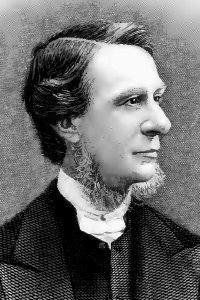Introduction

Born: April 8, 1826, Fairfield, New Jersey.
Died: March 15, 1900, Monmouth County, New Jersey.
Buried: Maplewood Cemetery, Freehold, New Jersey.

Born: April 8, 1826, Fairfield, New Jersey.
Died: March 15, 1900, Monmouth County, New Jersey.
Buried: Maplewood Cemetery, Freehold, New Jersey.
Peter was the son of Harmanus Barkuloo Stryker and Blandina Cadmus. He married twice, to Caroline Henry Smock (1849) and Emily Susannah Hanaway (1891).
In 1841, Stryker entered the University of Pennsylvania. He studied there two years, then entered Rutgers College, New Jersey, graduating in 1845.
He studied theology at the seminary of the Reformed Dutch Church and graduated in 1848. He received his Doctor of Divinity Degree from the University of New York in 1866.
He was ordained in 1848, and served a number of pastorates:
In 1872, he toured Europe, Egypt, and Palestine.
Stryker contributed to the Christian Intelligencer, the National Advocate, and The Youth’s Temperance Banner.
An extract from one of his sermons:
Beloved Christians, let us look forward to heaven as the place of our abode when we shall have conquered the last enemy, Death. Sweeter bliss than the most fertile imagination can conceive, purer and more perfect enjoyment than the Christian can anticipate, awaits us there.
All past evil will be forgotten, and the future be entirely free from sorrow. Every blessing which an intelligent and holy being can desire will be provided.
The society of all the good who have ever inhabited the earth, and the angels who have never sinned, and what is infinitely more to be desired, the fellowship and love the triune God, will be enjoyed!
Oh! how ravishing the anticipation! To see the great white throne, the fountain gushing beneath it, the river and the tree of life, the glory of the Lord; to wear the crown, and hold the palm of victory, and strike the golden harp; to hear the anthem of the angels and all the redeemed, and see the smile of Jesus.
To join in the song of triumph, to have unfolded to our view the great mystery of redemption, and learn more and more of the wonderful nature of God, and the astonishing perfection of His works—
To do and experience all this, and yet to be so constituted as to feel no weariness; to behold eternal day, and need no night to bring repose; to see eternal sunshine, and require no shadows to make us better appreciate the full splendor.
To eat, but never feel satiety; to drink, but never become intoxicated; to glide along a calm sea that never has a ripple; to sing with millions, and not one note of discord.
And all the while the voice becoming attuned to higher and sweeter strains, the ear accustomed to drink in more delicious melodies, the mind expanding to comprehend richer truths, and the heart developing to the experience and expression of purer and fuller love!
Praise, higher praise! Oh! this is Heaven. This is what the poor, toiling, careworn, infirm, sick, dying believer will experience when he has crossed the rill of death, and reaches the celestial city. This is what millions of poor pilgrims who rest from their weary journey have gained.
Peter H. Stryker (1826–1900)